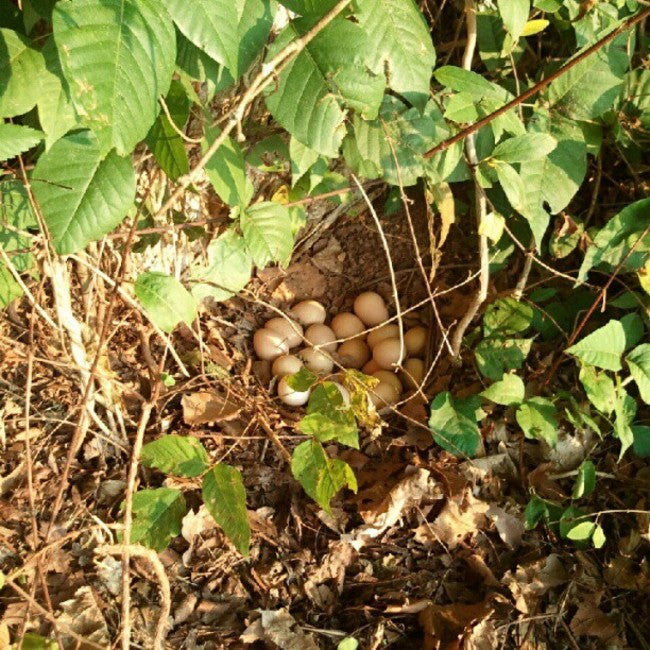
 Guinea hen gettin' broody with it
Guinea hen gettin' broody with it
One of our guinea hens is gettin' broody these days. Actually, she’s the only adult guinea hen we have right now. For the past few days she’s been sitting on about 20 eggs tucked away in a strip of trees and vines.
For a while she was laying her eggs in the salvaged-barn chicken coop we built. We always left one or two eggs in there so she would keep laying in that spot and we could eat her eggs. Guinea eggs are pretty tasty. Very rich, lots of yolk.
One day a few weeks ago she figured out our game and said to hell with laying eggs in the coop. She was gonna find another spot. After all, her and Guinea Cent wanted to start a family. That’s cool with us, so we didn’t bother to hunt down her nesting spot. Eventually we figured she’d get broody and we’d see where she’d been hiding them.
 Empty nest, quick, get the eggs! Just kidding, we didn't do that. Glad a snake hasn't found it
Empty nest, quick, get the eggs! Just kidding, we didn't do that. Glad a snake hasn't found it
While she's laying the eggs you would never know where they were. She would sneak off during the day, lay an egg, and then go right back out to foraging. Pretty soon there's a ton of them. When she's getting broody she sits on the nest day and night, only taking short breaks to eat and drink every now and then. After a few weeks, if she’s been a good mother, her eggs should hatch. Then there will be a bunch of little guinea keets running around chasing her everywhere. That would be awesome.
We’re debating whether to raise the keets for her (i.e. save them from hawks and snakes), or just see what happens and hope that some survive. Guineas aren’t known for being great mothers, so it's a tough call. Assuming she successfully hatches her clutch, what do you think we should do?
 She's pretty darn well hidden if you ask me. We put out some coffee mugs with food and water so she doesn't have to go too far. Maybe a bad idea, could give her away. We put them farther away
She's pretty darn well hidden if you ask me. We put out some coffee mugs with food and water so she doesn't have to go too far. Maybe a bad idea, could give her away. We put them farther away
On the flip-side of our exciting maternity ward is the sad death of a guinea hen. So goes the farm. Some days bring new life, others see it slip away. I let all the birds out of the coop each morning and one day last week Guinea Cent was the only guinea to emerge. Typically, three would come running out. Right now one is getting broody, so that means two should run out. I opened up the big door to see what the deal was and there she lay, dead on the floor.
 We'll miss her, she was the third wheel
We'll miss her, she was the third wheel
We recently switched feed so we think it may have upset her stomach. The guineas don’t eat too much feed anyway, so we didn’t think much of it. They are voracious foragers. She had a yellow mass of what looked like intestines or backed up feces in her rear. No other signs of illness. In fact, she was the biggest and by far the healthiest of all the guineas. We had raised her since she was 3 weeks old. It’s always sad when an animal passes under your watch. We’ll miss her.
But we look forward to our new little babies that might hatch out in a few weeks. The circle of life goes on.


